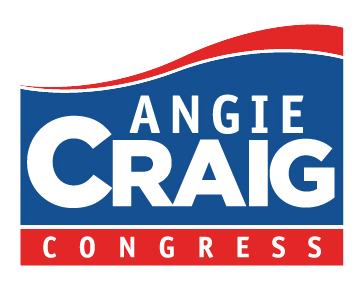By: Gabe Schneider
6/24/2019
Rep. Angie Craig said that after she leaves Congress, she’s never going to become a lobbyist. And if she has her way, neither will any other member.
On Friday, Craig introduced the Halt Unchecked Member Benefits with Lobbying Elimination — or HUMBLE — Act. The bill is a grab bag of anti-corruption and accountability reforms: It would ban members from holding individual stock, ban them from purchasing first-class airline tickets with office travel expenses, ban former members of Congress from using congressional facilities, and perhaps most critically, ban members from becoming lobbyists.
“At the end of the day, the only influence I want is the influence I have when doing town halls,” Craig said in an interview. “The only influence I want are from the panels that I host back in the Second Congressional District, where we have advocates, and patients and doctors talking about the cost of prescription drugs.”
Craig’s advocacy for government reform isn’t limited to just this bill. She worked to pass an amendment for H.R.1, the House’s large transparency and government reform package, that would ban House members from serving on corporate boards.
Broad support
Craig’s ideas are popular among her colleagues. The HUMBLE Act is full of reforms that have been individually proposed by other members.
Democratic Sens. Jeff Merkley of Oregon and Sherrod Brown of Ohio also want to ban members from buying individual securities. And Republican Rep. Rob Wittman of Virginia also introduced legislation in January to ban members from taking first-class fights.
One component of Craig’s bill seems to take things a step further. Former members who are registered lobbyists were banned from using certain House facilities in 2006. But Craig’s bill would ban all former member of Congress from using House athletic facilities, parking spaces and other areas where they could potentially interact with their former colleagues.
The key piece of reform in Craig’s bill, a lifetime ban on lobbying or former members, has gained the most traction in recent months from a variety of strange allies. Republican Sen. Ted Cruz of Texas and Rep. Ocasio-Cortez have floated writing a bill together to get this done. And Democratic Sens. Michael Bennet of Colorado and Elizabeth Warren of Massachusetts — both running for president on starkly differently platforms — have made a similar suggestions. So have Republican Sens. Rick Scott, of Florida, and Mike Braun, of Indiana.
Current law only requires a one year “cool-off” period before former members and certain congressional employees lobby.
‘Shadow lobbying’
While lifetime lobbying bans may be popular, public accountability experts believe that this kind of legislation could open up a lot of problems. While a ban on lobbying would impact those who register and are officially classified lobbyists, former members who do lobbying-related activities could get by.
“It doesn’t go far enough in the sense that it doesn’t cover a lot of lobbying related activities,” said Lee Drutman, an adjunct professor at Johns Hopkin and the senior fellow in the political reform program at New America. “Strategic advising, consulting stuff that you or I would consider lobbying, it just encourages former members to do the kinds of stuff that is less transparent and is more like shadow lobbying.”
In an interview with Vox, Dan Auble, senior researcher at OpenSecrets, had the same concern. “They still have a lot of opportunity to point their clients and the firms they work for toward which levers in Congress to pull without actually having to make the calls themselves, which absolves them of the requirement to file,” he said.
H.R. 1 would make these registration requirements more stringent. But while it has passed the House, it looks unlikely that it will get a Senate vote. That means that if Craig’s HUMBLE Act were to be signed into law now, it would be signed without accounting for lobbying-adjacent activities that are popular among former members and don’t require federal registration.
Apart from H.R.1, Drutman said these types of reforms only tackle the symptom, not the problem. He said that he believes the real issue isn’t banning lobbying or preventing pay raises. It’s that lobbying firms exhibit too much influence because they can hire up underpaid congressional staffers with expertise and have the ability to write policy in the first place.
Drutman said that members, including Craig, should focus on the issue holistically. “If she’s serious she should increase funding for the legislative branch, pay staffers more, and hire more staffers so that Congress is not dependent on private lobbyists,” Drutman said. “That would suggest that she’s serious. This is just pure symbolic minor league stuff.”
For her part, Craig said that in order to get her job done for constituents, she thinks people need to trust Congress.
“I just think it would help restore the American people’s confidence in Congress, if we didn’t become lobbyists, if we didn’t have access to other members after we leave, if we didn’t hold individual stocks,” she said.
“The American people and Minnesotans ought to know that when they send us here we’re here for one reason only. And that’s to serve our community and our neighbors.”
